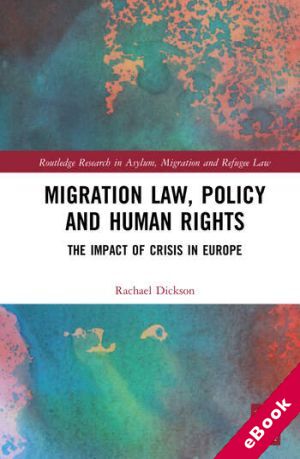
The device(s) you use to access the eBook content must be authorized with an Adobe ID before you download the product otherwise it will fail to register correctly.
For further information see https://www.wildy.com/ebook-formats
Once the order is confirmed an automated e-mail will be sent to you to allow you to download the eBook.
All eBooks are supplied firm sale and cannot be returned. If you believe there is a fault with your eBook then contact us on ebooks@wildy.com and we will help in resolving the issue. This does not affect your statutory rights.
Migration is one of the greatest societal challenges of our time. Illicit industries facilitate border crossings at the expense of safety, and governments face problems processing and integrating new arrivals. This book analyses the law and policy of migration in the European Union (EU) and its relationship to understandings of the EU as an international human rights actor. It examines the role crisis plays in determining the priorities of migration policy and the impact political exigencies have on the rights of migrants.
This book problematizes the EU Area of Freedom, Security and Justice (AFSJ) as a ‘home’. Taking a governmentality approach to critique discourse, the idea of a holistic approach is deconstructed to explore notions of wellness, resilience, responsibilisation and externalisaton. The EU’s pursuit of a holistic approach to managing migration in crisis indicates problems with EU solidarity. Tactics employed to control the crisis reveal security concerns that provoke questions about the EU as an international human rights actor. This framework for analysis and the empirical findings make a significant contribution to how the migration crisis can be theorised using adaptable conceptual tools. Under this form of governance, migration becomes a phenomenon to be treated so that its symptoms are ameliorated. This book will interest students and scholars of the EU, migration, and human rights as well as policymakers, commentators and activists in these areas.